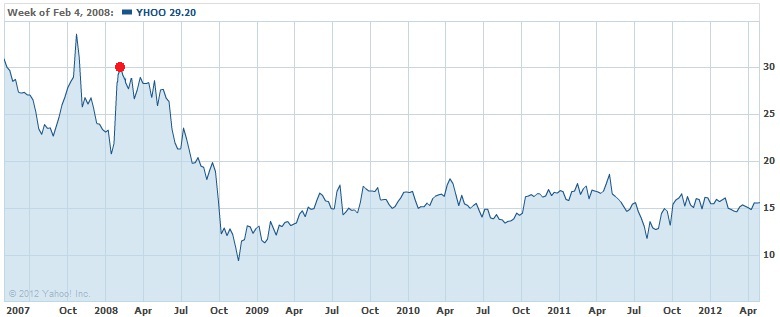There’s a reason why mothers shouldn’t judge their children in beauty pageants, why chefs rarely run the business side of restaurants successfully, and why Steve Jobs had to be fired and rehired before making Apple the biggest tech company in the world. Pride and prejudice get in the way of sound decisions sometimes, and when Yahoo didn’t take the $44.6 billion offer from Microsoft in February, 2008, many people pointed to co-founder Jerry Yang as the reason they hesitated and eventually lost the opportunity.
As Yang himself said, the consolation prize of working out a search deal with Microsoft “hasn’t gone the way they wanted.”
As Microsoft CEO Steve Ballmer said the day before Yang’s statement, “Sometimes you’re lucky.”
Yang resigned from the board of directors earlier this year.
The week that Microsoft offered $31 a share to Yahoo, the stock was valued at $29.20, making it a favorable offer to many. Since the beginning of 2009 months after it was clear that Microsoft nor anyone else was going to buy the struggling company, Yahoo shares have not broken $19 and currently hover around $15.
Their Market Cap is $19.17 billion, making it nearly impossible that they would ever get within $25 billion of the offer that Microsoft made if they were able to find a suitable buyer. It was a huge opportunity lost. The chef was running the restaurant.
Here’s a graphic that demonstrates just how quickly Yahoo has plummeted and pointing to a potential bust in the near future. If it happens, this may indeed be the biggest business blunder in tech history. They’re not the first online empire to fall, but they passed up on a lot of money going in.

From: Edmond Chevrolet Via: High Table





No way man for real? Who comes up with all that stuff?
http://www.Total-Privacy dot US
No. The biggest blunder (unless it was deliberate) in tech history will easily go down as Nokia CEO Stephen Elop announcing on Feb 11th 2011 that Symbian was being sidelined and eventually terminated, long before they had competitive Windows Phone (Lumia) products ready to go (which won’t be before WinPho 8, near the end of this year, and nearly 2 years after the announcement). This single act sparked a chain of events that has seen Nokia post the biggest and fastest losses of any corporation in history (this is proven historical fact by the way).
Nokia should very obviously have tentatively introduced Windows Phone in limited markets (e.g. the USA) and fully got behind Symbian until and if Lumia grew to support Nokia’s smartphone business.
In fact, please could you do a similar article and infographic on Nokia’s truly disastrous share price, market value, sales and image losses and crash over the last year or so. There is no other event in corporate history that has been so big a fall as Nokia’s.